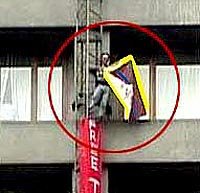

 "There was no point in sitting for a hunger strike at Azad Maidan, because Zhu Rongji would not even be aware of it. So I thought of doing something different to protest the Chinese occupation of Tibet and reiterate the Tibetans' demand for freedom," said a charged-up Tenzin Tsundue while sitting amidst the Friends of Tibet at a Churchgate restaurant, minutes after he was released on surety by the Cuffe Parade police.
"There was no point in sitting for a hunger strike at Azad Maidan, because Zhu Rongji would not even be aware of it. So I thought of doing something different to protest the Chinese occupation of Tibet and reiterate the Tibetans' demand for freedom," said a charged-up Tenzin Tsundue while sitting amidst the Friends of Tibet at a Churchgate restaurant, minutes after he was released on surety by the Cuffe Parade police.
Looking back on the most eventful day of his life, the 26-year-old attributed his successful demonstration, despite heavy security arrangements, to three factors 'hard work, courage and lots of luck'. Tsundue said, 'It's a mystery how I went unnoticed in spite of heavy police bandobast.'
. . . . . . . . . . . . .
Preparations: Tsundue began preparing for the demonstration almost a week ago, after learning about the Chinese premier's Mumbai itinerary through newspapers. He himself stitched together three Chinese national flags to make the 30-foot banner that had 'Free Tibet' inscribed on it.
A day before executing his plan, Tsundue surveyed the area surrounding Hotel Oberoi to choose the spot for his protest. Seeing the scaffolding raised near the northern gate of Hotel Oberoi, Tsundue decided he would ascend it the next day and climb up to the poolside area, from where he would unfurl the Tibetan flag and the banner. Tsundue said, 'Till the last moment, even I didn't know that eventually I would climb 14 floors before launching my demonstration.'
Close Call:The next day, with the banner and the Tibetan flag strapped onto his back and hidden under a sleeveless black coat, Tsundue had barely reached Express Towers at around 10.20am when he heard the motorcade of the Chinese premier passing by.
'I waited for the motorcade to pass, so that the security officials' attention would shift to the museum the Chinese premier was going to. In the meantime, I would go up and take up a position along the wall by the time he came back.'
Even as he was about to jump the three-foot-high fence to reach the scaffolding, he saw a policeman walk towards him. Tsundue said, 'For a moment I thought it was all over, but to my relief he walked by. I stood rooted to the ground for a while and then swiftly jumped over the fence and made my way up the scaffold.'
Hoodwinking Security:As soon as the five-foot-three-inch Tsundee ascended to the poolside area, almost three storeys off the ground, he bumped into a group of workmen who were repairing a section of the hotel.
Pressed into striking a conversation to explain his climb up the scaffold, Tsundue bluffed that 'Prakash cementwala' had sent him to meet 'Mr Inamdar'. When the workers said that there was no Inamdar amidst them, he proceeded towards the main building, pretending to search for 'Inamdar'.
After another close shave, this time with a hotel security guard, Tsundue wasted no time in climbing onto the ladder supporting the materials lift. By the time he climbed the height of almost 150 feet and reached the 14th floor of the hotel, a sizeable crowd had assembled near the poolside.
On Top:Even as people urged him to climb down, Tsundue strapped himself to the ladder with a hook, unfolded the 30-foot banner and tied it to the ladder. He proceeded to unfurl the Tibetan national flag and began shouting pro-Tibet, anti-China slogans and flung leaflets towards the ground.
By now Tsundue's actions had attracted passers-by. Within minutes, hundreds of Nariman Point pedestrians had stopped in their tracks, bringing traffic to a halt. Amidst all the chaos, Tsundue looked across to the new wing of Hotel Oberoi and saw one of the Chinese delegates accompanying Rongji pull aside the curtain of his room to look at him. Tsundue said, 'In no time, every window on the entire floor had a Chinese face looking at me and I was proud to show them the Tibetan flag. That one moment was worth it all.'
Meanwhile, the hotel's security personnel threatened to release the materials lift above his head if he failed to climb down. An unfazed Tsundue held on. 'I did not worry about the threat being carried out, knowing that I was in India and not in China,' he said.
'Maine apna kaam kar liya hai, ab aap apna kaam kijiye':After almost 40 minutes of protesting and being strapped to the ladder, Tsundue was finally pulled into a nearby hotel room by Mumbai police officials.
He said, 'The moment I was inside the room, I just lifted my hands and surrendered. I said, 'Maine apna kaam kar liya hai, ab aap apna kaam kijiye'.' After some minutes of frisking and questioning, Tsundue was whisked away to Cuffe Parade Police Station through the service exit, even as eager journalists waited at the main entrance for him to emerge. With a hint of pride, he said, 'Even CID officials wondered how I managed to climb the 14 storeys despite heavy security.' He quickly added that he felt sorry for the security personnel who would run into trouble for his successful protest.
When Tsundue revisited the spot of his heroics late last night, he couldn't help but stare at the towering hotel. When asked what he was thinking, he said, 'I wonder how I did it.'




